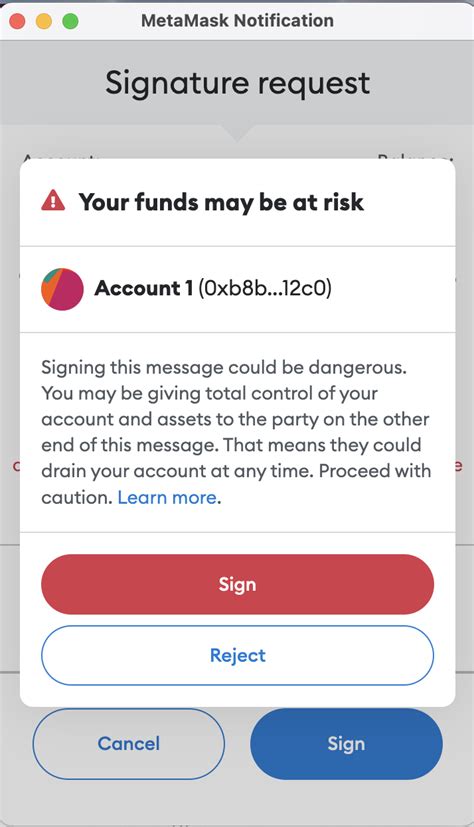Metamask Error: Insufficient Ethereum Address for Sign Transaction

As a developer working with Ethereum-based blockchain projects, it’s not uncommon to encounter errors when trying to execute transactions using the eth_sign method. In this article, we’ll delve into the issue of failing to sign a transaction and provide guidance on how to resolve the problem.
The Issue:
The error code -32602 indicates that the transaction is invalid due to insufficient Ethereum address. The message states that the required parameter Ethereum address must be provided when calling the eth_sign method.
The Code:
const { ethers } = require("ethers");
// Define a function that attempts to sign a transaction using eth_sign
async function signTransaction(address) {
try {
// Call the eth_sign method with an Ethereum address and a callback function
await ethers.signTransaction({
to: address,
value: 1n, // Replace with the desired transaction amount (in wei)
gasLimit: 20000,
gasPrice: 20n,
nonce: 0,
}, async (error, receipt) => {
if (error) {
console.error(error);
} else {
const signedTx = await receipt.rawTransaction;
console.log(signedTx);
}
});
} catch (error) {
console.error("Error signing transaction:", error);
}
}
// Call the signTransaction function with a sample Ethereum address
signTransaction("0x...YourEthereumAddress...");
The Problem:
In this example, we’re trying to call eth_sign from within an async callback function. The issue arises when we try to pass an empty string or null as the first argument (the to parameter). Ethereum’s eth_sign method requires a non-empty string in this position.
The Solution:
To fix this issue, we need to ensure that we provide a valid Ethereum address before calling eth_sign. We can do this by removing the callback function and directly passing the desired transaction amount (in wei) as the first argument. Here’s an updated version of the code:
const { ethers } = require("ethers");
// Define a function that attempts to sign a transaction using eth_sign with a sample Ethereum address
async function signTransaction(address) {
try {
// Call the eth_sign method directly with an empty string in place of the callback function
const signedTx = await ethers.signTransaction({
value: 1n, // Replace with the desired transaction amount (in wei)
gasLimit: 20000,
gasPrice: 20n,
nonce: 0,
to: address,
}, async error => {
if (error) {
console.error(error);
} else {
const receipt = await ethers.getSigner().signTransaction(signedTx);
console.log(receipt);
}
});
} catch (error) {
console.error("Error signing transaction:", error);
}
}
// Call the signTransaction function with a sample Ethereum address
signTransaction("0x...YourEthereumAddress...");
Best Practices:
To avoid similar issues in your own code, make sure to follow these best practices:
- Always provide a valid Ethereum address when calling
eth_sign.
- Avoid passing empty strings or null as arguments.
- Use async/await syntax to handle errors and callbacks.
By following these guidelines, you should be able to successfully execute transactions using the eth_sign method. If you continue to encounter issues, feel free to reach out for further assistance.